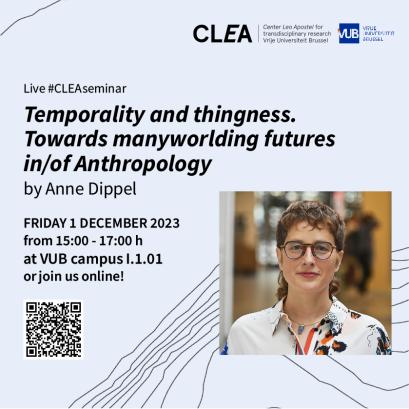Multiple agents weave the fabric of temporality in a data-driven world, at the same time orchestrating futures and visions of (un)certainty and sparking promises to contain what is to come. The possibilities of modeling the world with algorithmic means are fundamentally changing perceptions of humans experiencing time and space - new publics, new socialities, new identities are emerging, and rules of coexistence must be negotiated with them. What interests Anne Dippel, is how phenomena come into being and how temporality operates as part of research processes within complex infrastructures, entangling humans and more-than-humans, hardware, software and algorithms in a techno scientific as well as posthuman world of many worlds. In this talk, Anne Dippel will address the above questions by means of an “ethnographic rhythm analysis“. She will share analytic outcomes based on data gathered during a long-term qualitative research in algorithmic environments at the European Organization for Nuclear Research (CERN), the Supercomputing Centre in Jülich, as well as the experimental world of quantum optics of University Vienna. She will look into the rhythms of “doing things” and the thingness’ agencies, with a focus on procedural models, material cuts and ruptures which disturb and destabilise seemingly seamless infrastructures. This will allow her to draw preliminary sketches of what seems to be important to share from anthropology as a discipline to critically (re)think present times future(s) to come from a theoretical and ethical perspective.
About the speaker
Anne Dippel is a freshly habilitated cultural anthropologist and historian with a passion for ethnographic inquiries of all kind, researching and teaching at University of Jena (Germany). She studied in Berlin and London and became a specialist in physics and computers scientific cultures as well as German speaking societies. She held fellowships, taught and researched in Germany and abroad, including at the Massachusetts Institute of Technology (MIT), the Cluster of Excellence “Image Knowledge Gestalt” (HU Berlin), the Institute for the Advanced Study of Media Cultures of Computer Simulation (MECS) at Lüneburg University and the Department for Ethnology at the University of Heidelberg. Anne Dippel did extensive ethnographic research in Vienna/Austria, Geneva/Switzerland and different physics laboratories and data centres in Europe and USA. For the purpose of her current research, she has been an associated member of the European Center for Nuclear Research (CERN).
Practical
The CLEA seminars are taking place simultaneously at the VUB campus and online (via Zoom) and are open to everyone interested!
When. Friday December 1, 2023 from 15:00 until 17:00 h
Where. VUB campus Pleinlaan 2, 1050 Elsene. Building I, room I.1.01
Online. You can follow the seminar online via Zoom. You may need a Meeting ID and passcode to enter.
Zoom link: https://us06web.zoom.us/j/82757798426?pwd=em9sQlJDVjJYTEFRNk01dEJLWGxGUT09
Meeting ID: 827 5779 8426
Passcode: 122127
Mailing list. If you want to be notified of our next seminars, you can register here to join the CLEA mailinglist.

